How to Implement Salesforce HIPAA Compliance
 Dorian Sabitov
Dorian Sabitov
Understanding the Need for Salesforce HIPAA Compliance
HIPAA compliance is essential for any organization that handles protected health information (PHI). The Health Insurance Portability and Accountability Act (HIPAA) was established in 1996 to protect patient privacy and ensure healthcare data is handled securely. HIPAA requires healthcare providers, insurers, and their service partners (like Salesforce) to follow strict rules on how they collect, use, and store sensitive patient data.
A HIPAA violation can lead to serious consequences for a company that manages PHI, including fines up to $1.5 million per year and, in severe cases, criminal charges with fines up to $250,000 and imprisonment up to ten years. And of course, organizations risk damaging their reputation and losing patient trust.
To illustrate the ongoing challenges healthcare providers face with privacy compliance, consider this statistic: as of June 2024, the U.S. Department of Health and Human Services (HHS) reported receiving 363,798 complaints about HIPAA Privacy Rule violations since 2003. Or we can just look at this published graph:
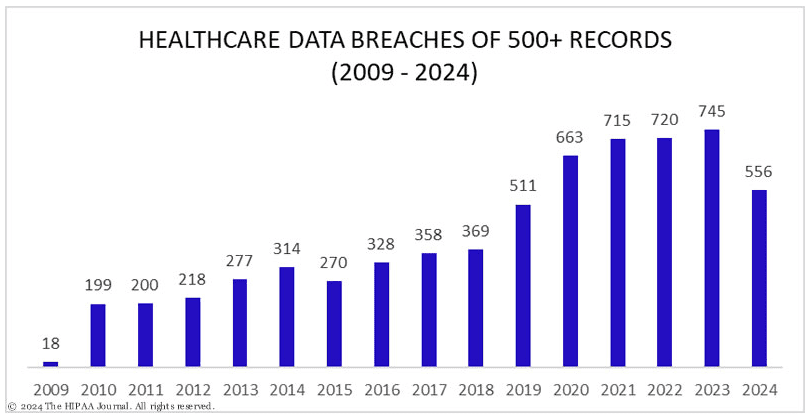
Statistics of Healthcare Data Breaches
Salesforce, a widely used platform for managing customer relationships and data, has become popular in healthcare due to its flexibility and powerful data management tools. However, using Salesforce in a HIPAA-compliant way requires careful planning, as the platform itself doesn’t automatically guarantee compliance. It’s up to each organization to configure Salesforce properly, implement the right security features, and follow best practices to protect patient information.
- Is Salesforce HIPAA Compliant?
- How to Make Salesforce HIPAA Compliant
- Salesforce Compliance for Specific Clouds
- Third-party Apps for Ensuring Compliance and Running Audits
- Frequently Asked Questions (FAQ) on Salesforce HIPAA Compliance
- Moving Forward with Salesforce HIPAA Compliance
This guide shows you how to set up and manage Salesforce to meet HIPAA requirements, covering what HIPAA compliance means in Salesforce, steps to secure different Clouds like Health Cloud and Service Cloud, and tools for auditing and encryption.
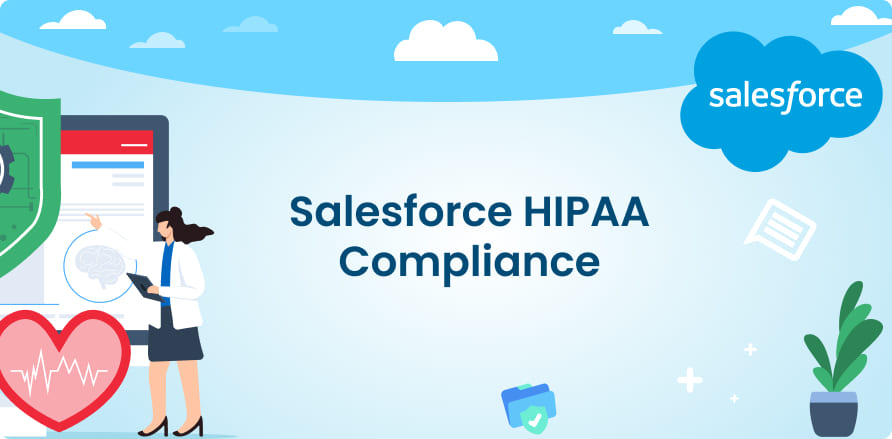
Is Salesforce HIPAA Compliant?
Salesforce can be configured to meet HIPAA compliance requirements, but it is not inherently HIPAA-compliant out of the box. HIPAA compliance isn’t just about the software itself – it’s also about how you use and manage the system. For organizations in healthcare and other industries that handle protected health information (PHI), meeting HIPAA standards means implementing strong security measures, monitoring data access, and regularly auditing processes to ensure privacy.
To support HIPAA compliance, Salesforce offers several tools and configurations designed to secure sensitive data. Key among these is the Business Associate Addendum (BAA), an agreement between Salesforce and the healthcare organization that specifies shared responsibilities for protecting patient information. By signing a BAA with Salesforce, organizations acknowledge Salesforce as a “business associate” under HIPAA, meaning they are trusted to handle PHI under strict privacy and security guidelines.
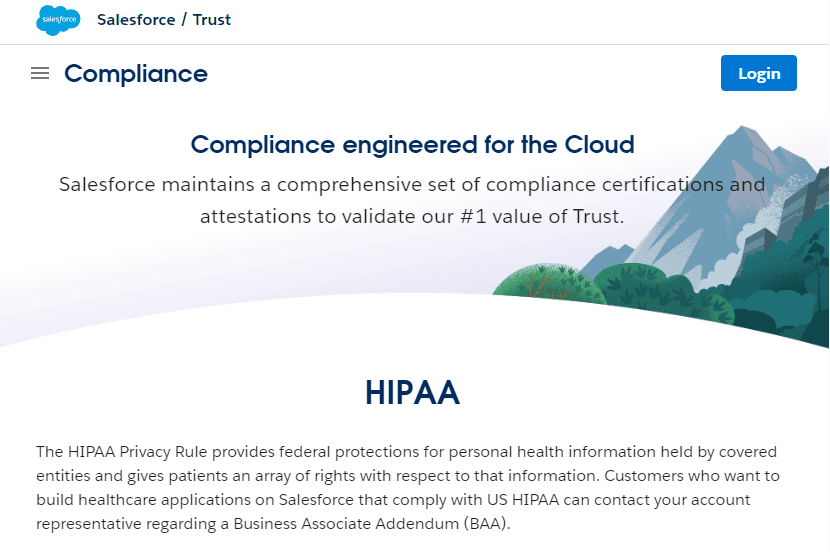
HIPAA on the Salesforce Compliance Portal
However, signing a BAA is just the first step. Organizations are responsible for ensuring that Salesforce is configured in a way that aligns with HIPAA requirements. This includes activating features such as Salesforce Shield, which provides enhanced encryption, field audit tracking, and event monitoring. Salesforce Shield is important for organizations that want to meet HIPAA regulations in their data protection strategies. It is a key part of the Salesforce Shield HIPAA compliance approach. Additionally, data access should be tightly controlled, with permission settings and regular audits to monitor who has access to PHI.
In short, Salesforce can support HIPAA compliance when properly configured, but the ultimate responsibility lies with each organization to follow best practices, set up the appropriate security measures, and manage access to PHI.
How to Make Salesforce HIPAA Compliant
Achieving HIPAA compliance Salesforce involves more than simply using the platform – it requires configuring the right settings, activating specific features, and establishing internal processes that protect patient data. Here are some actionable steps to help organizations make Salesforce HIPAA-compliant:
1. Sign the Business Associate Addendum (BAA)
As a foundational step, healthcare organizations must sign a Business Associate Addendum (BAA) with Salesforce. To do this, you need to contact your Salesforce Account Executive. The BAA outlines Salesforce’s and the organization’s shared responsibilities in protecting PHI and is a key legal requirement for HIPAA compliance.
2. Enable Salesforce Shield
Salesforce Shield offers critical tools to enhance data protection, including:
- Platform Encryption: This feature provides Salesforce HIPAA encryption to secure sensitive data at rest within Salesforce. Organizations can effectively protect patient information by keeping data encrypted, even if there is unauthorized access. Platform Encryption covers standard fields, files, and attachments, providing added security for all data stored in Salesforce.
- Field Audit Trail: Tracks changes to data over time, making it easier to see when and how records have been updated. This feature helps with accountability and allows organizations to audit data changes, which is essential for HIPAA compliance.
- Event Monitoring: Provides detailed insights into user activity, allowing administrators to see who accessed data, what they viewed, and what actions they performed. This visibility helps prevent unauthorized access and gives a clear record of system activity for auditing purposes.
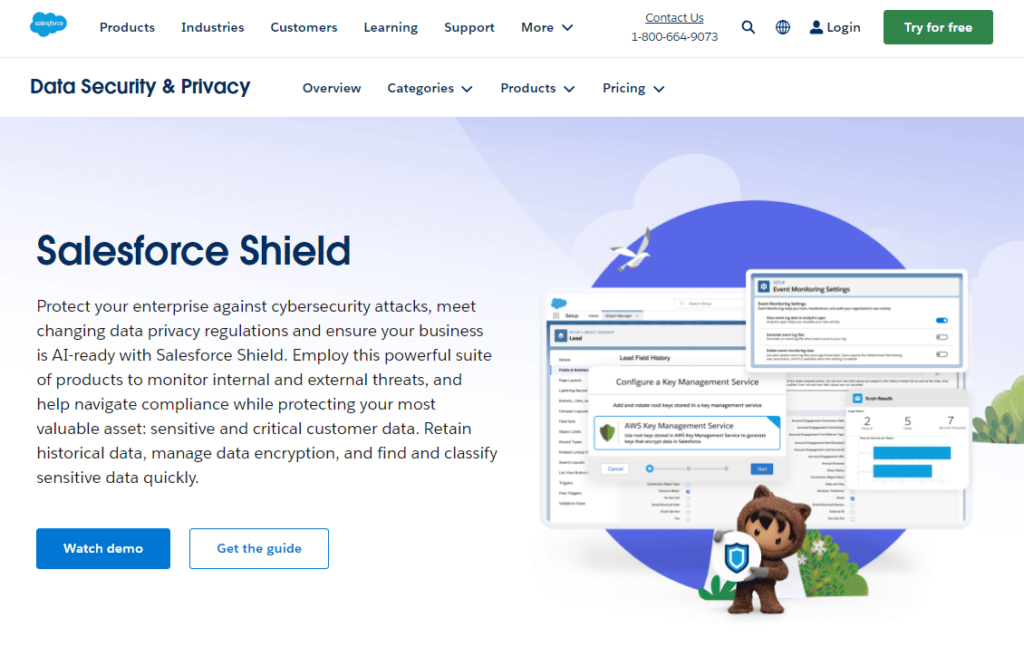
Salesforce Shield Website
3. Configure User Permissions and Access Controls
Controlling access to sensitive information is essential for HIPAA compliance. Salesforce allows administrators to set permissions and restrict access at the user, role, and profile levels. Some best practices include:
- Limiting access to PHI based on role-specific requirements.
- Implementing a Salesforce users permissions audit to systematically assess access rights and ensure compliance with internal policies.
- Implementing multi-factor authentication (MFA) to add an additional layer of security for users accessing Salesforce.
4. Implement Data Masking
Data masking tools in Salesforce allow administrators to obfuscate sensitive data in specific fields, making it unreadable to unauthorized users. Data masking is especially useful for testing environments, where real data can be replaced with fictitious values to prevent exposure while maintaining the integrity of testing processes.
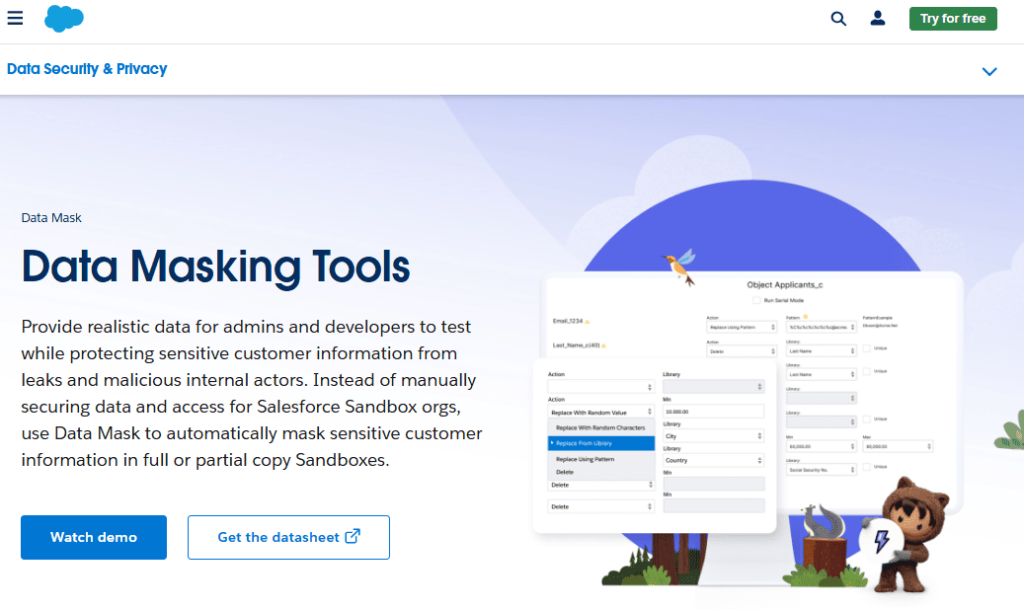
Data Masking Tools on the Salesforce Website
5. Conduct Regular Security Health Checks
Salesforce Security Health Check is a feature that evaluates your system’s security settings against Salesforce’s baseline standards or custom security policies. This tool provides insights into potential vulnerabilities and helps administrators address risks proactively. Running regular security health checks is essential to ensure your configuration remains compliant over time.
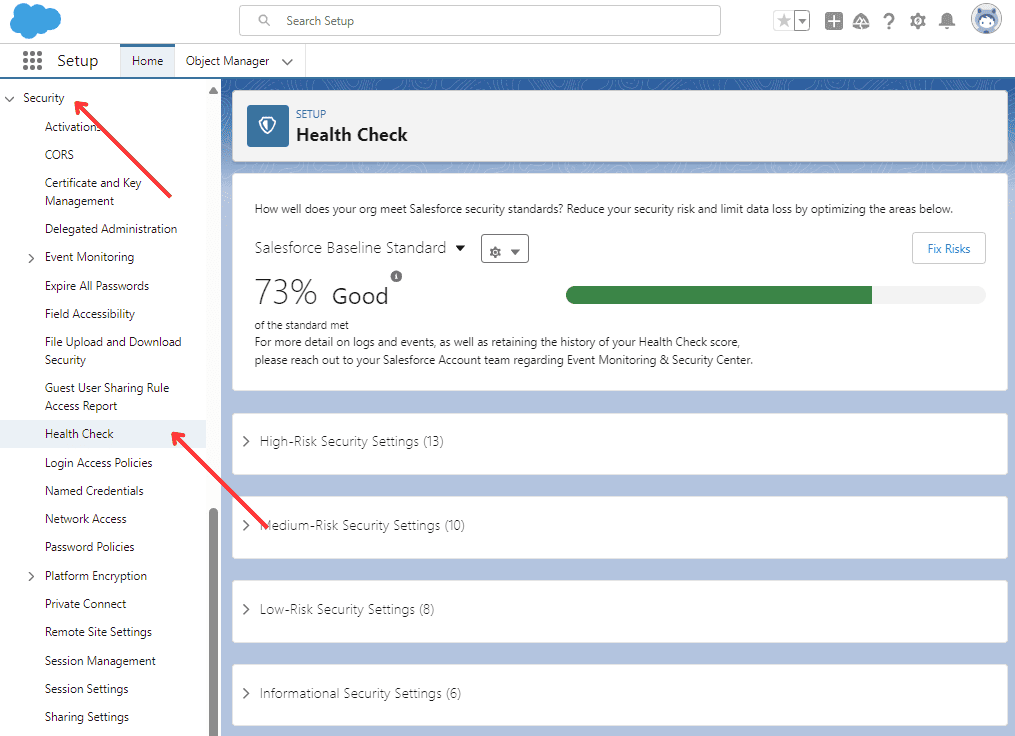
Salesforce Security Health Check in Setup
6. Use Third-Party Apps for Additional Security
The Salesforce AppExchange includes several third-party applications designed to help with HIPAA compliance, such as user access monitoring, and data masking tools.
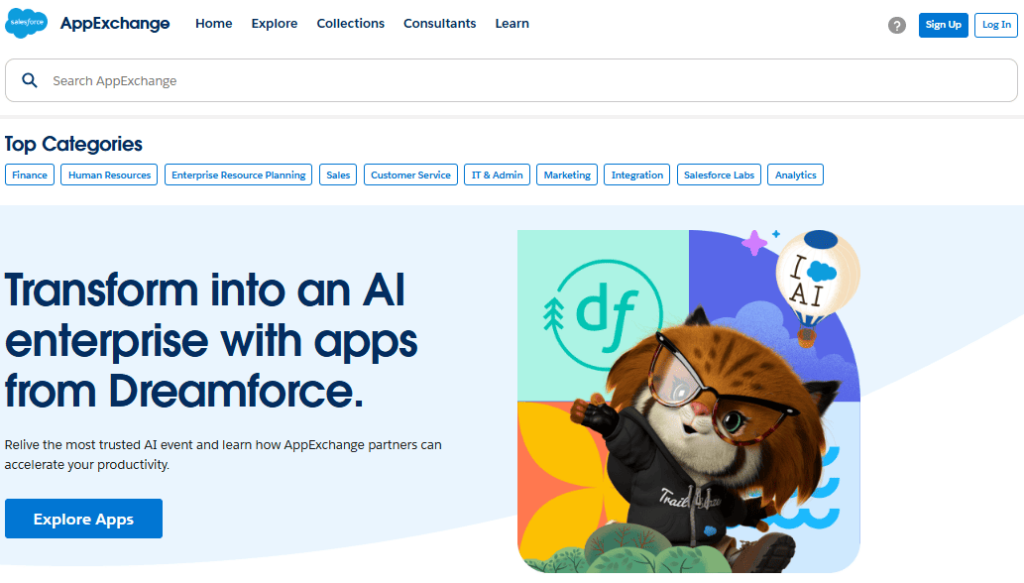
Salesforce AppExchange Main Page
7. Establish a Data Backup and Recovery Plan
A strong data backup and recovery plan is essential for HIPAA compliance. Salesforce offers tools for data export, and many organizations use third-party services to back up their Salesforce data regularly. This helps ensure that data can be recovered in the event of accidental loss or cyber incidents.
By following these steps and leveraging Salesforce’s security features, organizations can enhance their Salesforce environment to support HIPAA compliance. However, continuous monitoring, regular audits, and adapting security measures over time are equally important to maintaining compliance as organizational needs evolve.
Salesforce Compliance for Specific Clouds
Salesforce provides several cloud offerings tailored to different industry needs, each with its own set of capabilities for managing data securely. Here’s a closer look at how Salesforce clouds – Health Cloud, Service Cloud, and Marketing Cloud – support HIPAA compliance and what steps organizations need to take within each environment.
1. Salesforce Health Cloud and HIPAA Compliance
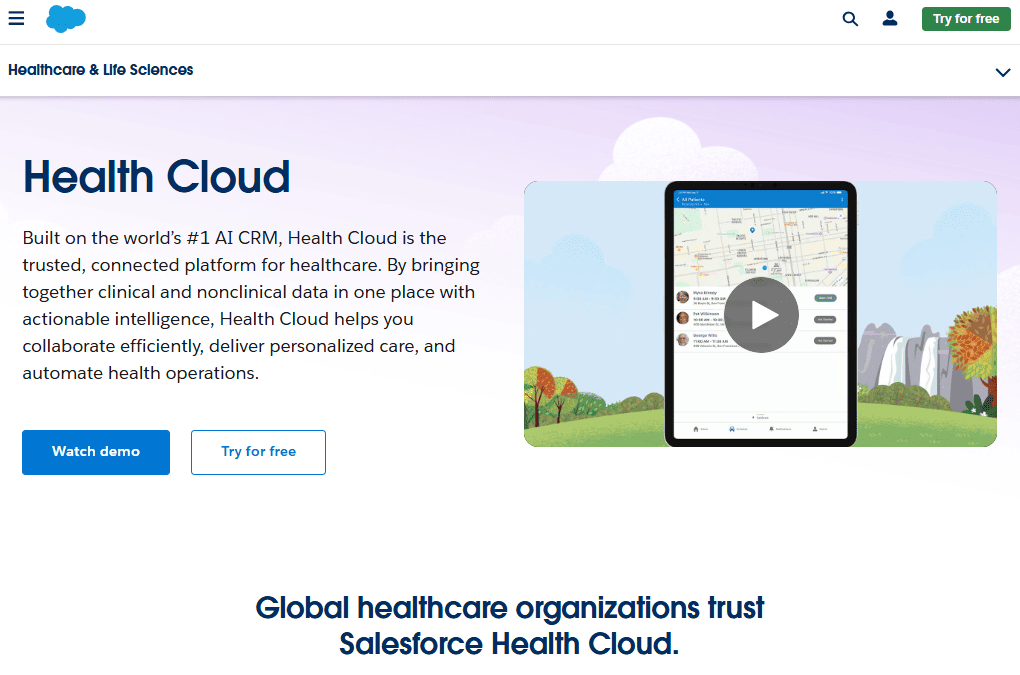
Salesforce Health Cloud Website
Overview: Health Cloud is designed for healthcare organizations, providing tools to manage patient relationships and health data securely. Since Health Cloud is natively built to handle sensitive patient information, it’s particularly suitable for organizations that need HIPAA compliance. Organizations must evaluate whether is Salesforce Health Cloud HIPAA compliant by leveraging its key compliance features.
Key Compliance Features:
- Enhanced Patient Data Management: Health Cloud structures data in a way that makes it easy to securely manage and access PHI. To effectively leverage these features, organizations must ensure their understanding of Salesforce Health Cloud HIPAA necessary security measures.
- Protected Health Records: Health Cloud can integrate with Electronic Health Record (EHR) systems, maintaining a high standard for data privacy.
- Secure Messaging: Health Cloud offers HIPAA-compliant secure messaging features, allowing healthcare providers to communicate safely with patients and other providers.
Recommended Actions:
- Activate Salesforce Shield for added encryption and auditing.
- Regularly conduct User Access Reviews to ensure that only authorized personnel have access to sensitive patient information.
- Consider Salesforce Health Cloud implementation services to ensure they are effectively utilizing the platform’s capabilities for HIPAA compliance.
2. Salesforce Service Cloud and HIPAA Compliance
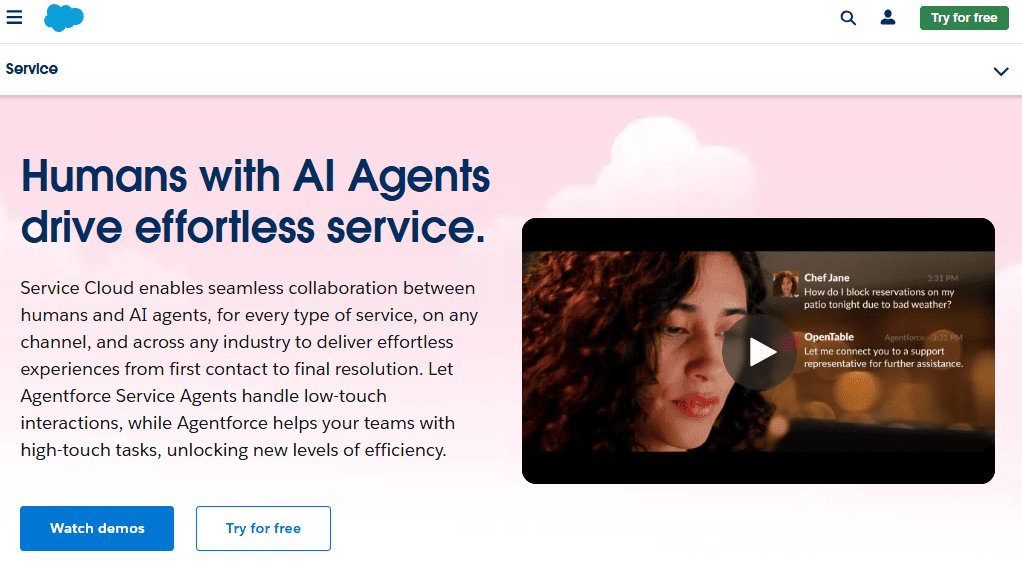
Salesforce Service Cloud Website
Overview: Service Cloud is often used to manage customer service interactions. In healthcare organizations, this means addressing patient inquiries, support requests, and managing services, all of which may involve protected health information (PHI). Ensuring that the Salesforce Service Cloud HIPAA compliant requires specific configurations to maintain data security.
Key Compliance Features:
- Case Management Security: Service Cloud’s case management system can be configured to restrict access to PHI, making it vital for organizations to focus on Salesforce Service Cloud HIPAA adherence to maintain data privacy.
- Audit Trail: Service Cloud can track all changes and access points for customer records, supporting transparency and accountability.
- Automated Workflow and Alerts: Automation can be set to notify administrators about changes or potential breaches, allowing for immediate action if unauthorized access occurs.
Recommended Actions:
- Ensure Role-Based Access Control is in place so that only personnel who need to handle sensitive cases can access the relevant data.
- Integrate with Secure Messaging solutions to communicate PHI safely, especially when following up with patients.
3. Salesforce Marketing Cloud and HIPAA Compliance
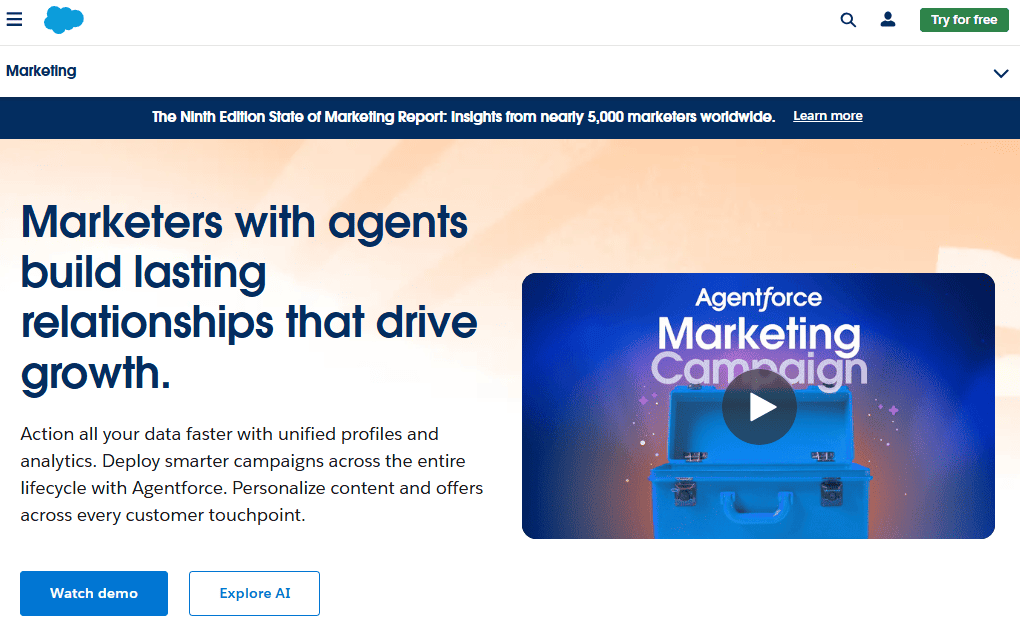
Salesforce Marketing Cloud Website
Overview: Marketing Cloud is used by organizations to connect with customers through email, social media, and advertising campaigns. For healthcare-related marketing, strict controls must be in place to prevent the exposure of PHI. Organizations must ensure that is Salesforce Marketing Cloud HIPAA compliant by implementing data protection measures and maintaining access controls.
Key Compliance Features:
- Data Encryption: Marketing Cloud supports encryption of customer information to protect sensitive data across campaigns.
- User Permissions and Access Management: Administrators can set permissions within Marketing Cloud to ensure that only marketing personnel who need to handle sensitive data can access it.
- Segmentation and Personalization: Marketing Cloud allows segmentation without requiring sensitive information to be directly included in campaigns, which reduces risk.
Recommended Actions:
- Use Encryption and Data Masking for customer data within campaigns to minimize exposure.
- Limit access to marketing data by implementing strict Permission Settings, ensuring that only the necessary team members can access sensitive customer details.
Each Salesforce cloud has unique features that can be configured to align with HIPAA’s requirements, but regardless of the cloud in use, regular audits, access control checks, and security updates are essential for maintaining compliance.
Looking for professional help with Salesforce HIPAA Compliance?
Request our consulting services!
Third-party Apps for Ensuring Compliance and Running Audits
To enhance HIPAA compliance within Salesforce, integrating specialized applications can add layers of security, streamline audits, and ensure data handling aligns with regulatory standards.
Data Compliance by Odaseva
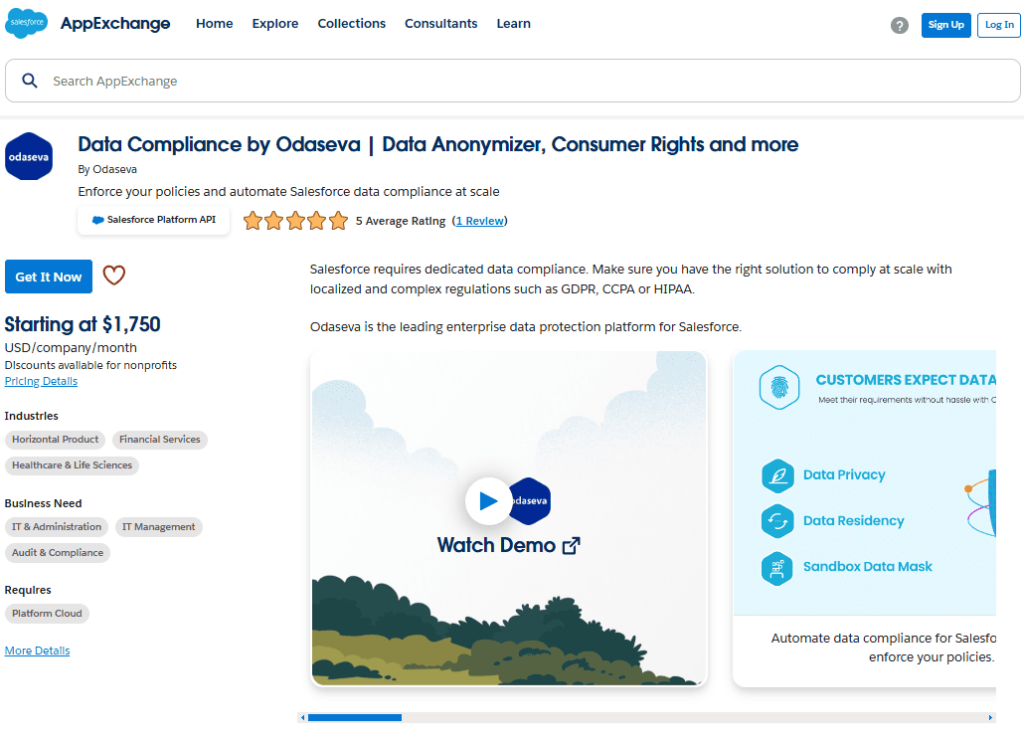
Data Compliance by Odaseva on AppExchange
Overview: Data Compliance by Odaseva is a powerful enterprise-grade platform designed to ensure data protection and regulatory compliance in Salesforce environments. Tailored to meet stringent data privacy regulations like HIPAA, this app automates complex compliance processes, including data anonymization, consumer rights management, and data residency requirements.
Key Features:
- Data Anonymization for Sandboxes: Protects sensitive health information by anonymizing PHI in both full and partial sandboxes, ensuring secure environments for development and testing while maintaining data utility for training purposes.
- Consumer Rights Management: Simplifies the handling of HIPAA-mandated data requests, such as access and deletion, through automated Subject Rights processes that can be executed with just a click within Salesforce.
- Data Residency Compliance: Ensures adherence to local data residency laws by allowing PHI to be stored and processed in specified geographic locations without disrupting Salesforce operations.
- Data Retention Policies: Automates the enforcement of data retention and deletion policies, ensuring that PHI is not kept longer than necessary, in line with HIPAA’s requirements for data minimization and secure disposal.
Pricing: From $1,750 USD/company/month. Discounts are available for nonprofits.
Link: Data Compliance by Odaseva on AppExchange
Cloud Compliance Privacy Center (GDPR, CCPA, LGPD)
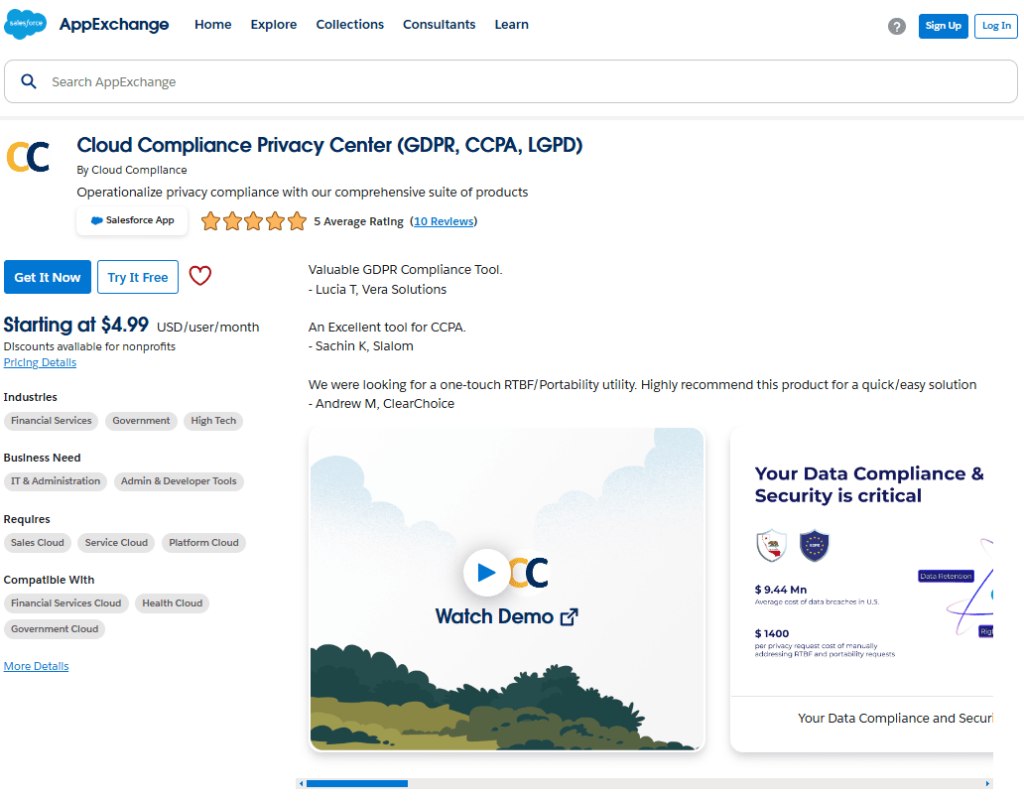
Cloud Compliance Privacy Center on AppExchange
Overview: The Cloud Compliance Privacy Center is an all-encompassing solution designed to help organizations achieve and maintain HIPAA compliance within their Salesforce environment. This app provides robust tools to safeguard Protected Health Information (PHI) while automating key privacy and data security tasks.
Key Features:
- HIPAA Privacy Rights Automation: Automates compliance with HIPAA requirements by managing data portability, and other sensitive data processes, ensuring that PHI handling aligns with regulatory standards.
- Sandbox Data Masking: Protects PHI in development and testing environments by masking sensitive information, thereby ensuring compliance throughout the application lifecycle.
- Consent Management: Streamlines the collection and management of patient consent for data use, integrating with tools like Salesforce Marketing Cloud to ensure compliance with HIPAA’s patient privacy requirements.
Pricing: From $4.99 USD/user/month. Discounts are available for nonprofits.
Link: Cloud Compliance Privacy Center on AppExchange
ComplianceSeal: Permission, Compliance and Governance Management Platform
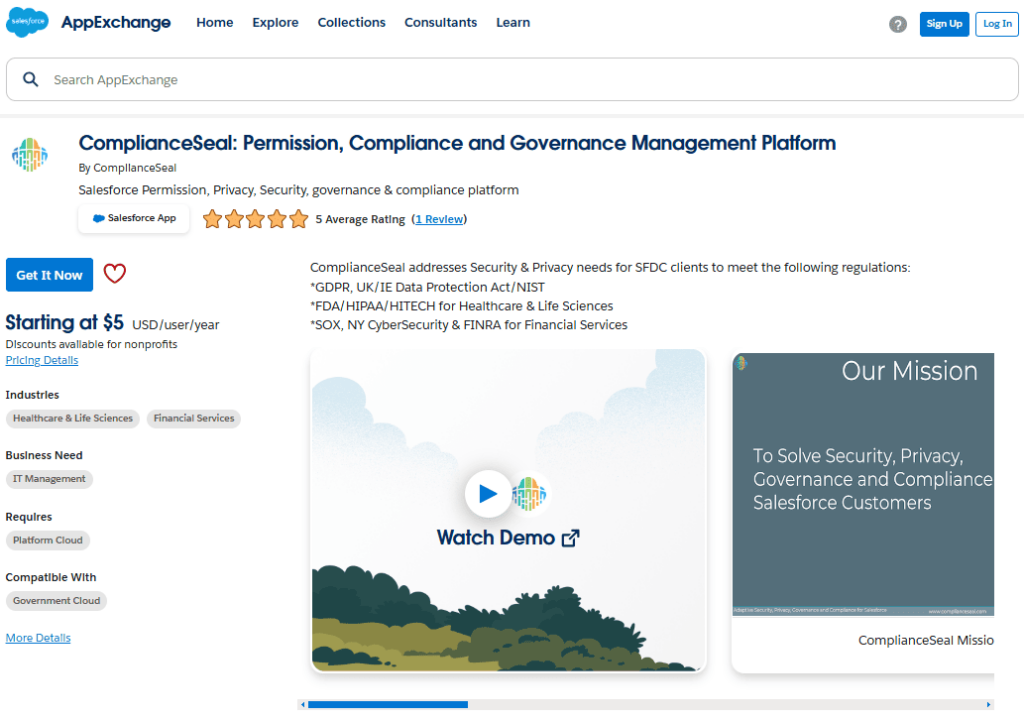
ComplianceSeal on AppExchange
Overview: ComplianceSeal is a comprehensive governance, risk, and compliance management platform specifically designed for Salesforce users. This native app focuses on ensuring secure collaboration within Salesforce environments while adhering to both internal and regulatory compliance standards.
Key Features:
- Content and Context Awareness: ComplianceSeal dynamically understands the content within your Salesforce org, providing real-time risk analysis and compliance status updates.
- Action-Oriented Tools: The platform offers actionable insights and recommendations to address compliance gaps or potential risks swiftly.
- Continuous Monitoring: Information Security Officers can leverage ComplianceSeal to monitor the Salesforce environment continuously, ensuring compliance is maintained without interrupting workflows.
Pricing: From $5 USD/user/year. Discounts are available for nonprofits.
Link: ComplianceSeal on AppExchange
Own Recover – Salesforce Data and Metadata Backup & Recovery
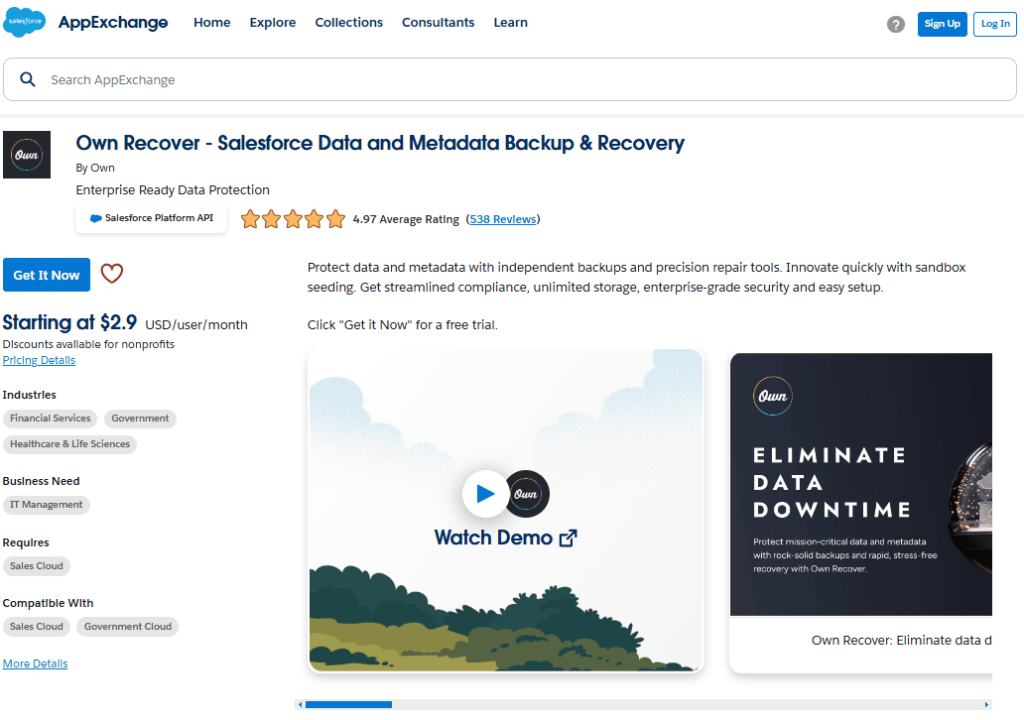
Own Recover on AppExchange
Overview: OwnBackup is a cloud backup and recovery solution that allows companies to securely back up Salesforce data and restore it as needed. It’s highly beneficial for organizations that need a robust disaster recovery plan.
Key Features:
- Automated Backups: Conducts scheduled backups of Salesforce data, ensuring that data is regularly and securely stored.
- Point-in-Time Recovery: Allows for precise data recovery, restoring information from a specific date and time if data loss occurs.
- Compliance Reporting: Generates reports demonstrating adherence to data storage and recovery standards, which can be helpful during HIPAA audits.
Pricing: From $2.9 USD/user/month. 14-Day Free Trial. Discounts are available for nonprofits.
Link: Own Recover on AppExchange
Gearset
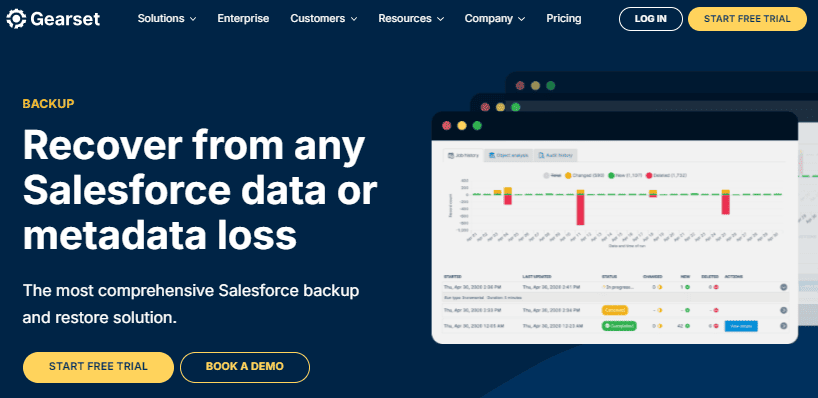
Gearset Website
Overview: Gearset provides a comprehensive Backup & Restore solution tailored for Salesforce users needing HIPAA compliance. It ensures data protection with automated backups, rapid restoration, and encrypted off-site storage, safeguarding PHI in line with regulatory requirements.
Key Features:
- Automated Backups: Daily backups with full encryption to secure PHI.
- Rapid Recovery: Fast, point-in-time data restoration, minimizing downtime and data loss.
- Auditing with version control: Detailed logs and version control to support compliance audits.
Pricing: From $200 USD/user/month.
Link: Gearset Website
Insight:
While technical measures are important for HIPAA compliance, the human factor plays a big role in data security too. Training employees on HIPAA regulations, data privacy, and best practices for handling Protected Health Information (PHI) is crucial. Comprehensive training programs can significantly reduce the chances of accidental breaches.
Using real-life scenarios and regular refreshers helps create a culture of compliance and vigilance within the organization. This not only helps staff recognize and respond to potential security threats but also instills a sense of responsibility in safeguarding patient data.
Frequently Asked Questions (FAQ) on Salesforce HIPAA Compliance
What is HIPAA?
HIPAA, which stands for the Health Insurance Portability and Accountability Act, was established in 1996. Its primary purpose is to protect the privacy and security of individuals’ medical information. HIPAA is overseen by the U.S. Department of Health and Human Services (HHS), specifically the Office for Civil Rights (OCR). The rules and regulations of HIPAA apply to the territory of the United States.
Who is required to comply with HIPAA regulations?
HIPAA regulations apply to covered entities and their business associates. Covered entities include healthcare providers, health plans, and healthcare clearinghouses. Business associates are individuals or entities that perform certain functions or activities on behalf of covered entities that involve the use or disclosure of PHI.
Is Salesforce HIPAA compliant out of the box?
No, Salesforce is not HIPAA compliant by default. While Salesforce provides robust security measures, HIPAA compliance requires specific configurations and additional services, such as Salesforce Shield and secure data management practices. Organizations handling PHI need to customize their Salesforce environment to meet HIPAA requirements and sign a Business Associate Addendum (BAA) with Salesforce.
What is a Business Associate Addendum (BAA), and why is it essential for HIPAA compliance?
A BAA is a legal contract that outlines the responsibilities of Salesforce and the client organization for protecting PHI. HIPAA mandates that covered entities (like healthcare providers) have BAAs with their service providers to ensure PHI is handled securely. Without a BAA, using Salesforce for PHI could result in non-compliance with HIPAA regulations.
What additional tools or services does Salesforce offer for HIPAA compliance?
Salesforce Shield is the primary tool offered by Salesforce to enhance HIPAA compliance. It includes Platform Encryption, Event Monitoring, and Field Audit Trail – features that help with securing data, monitoring access, and maintaining detailed audit records. Other third-party apps can further assist with compliance by adding additional monitoring, auditing, and backup capabilities.
Moving Forward with Salesforce HIPAA Compliance
Implementing HIPAA compliance in Salesforce is an ongoing commitment rather than a one-time configuration. By leveraging Salesforce’s advanced tools like Salesforce Shield, implementing strong access controls, and signing a Business Associate Addendum, organizations can establish a foundation for protecting PHI. However, maintaining HIPAA compliance requires continuous monitoring, regular audits, and adjustments as security needs evolve.
Each Salesforce Cloud – whether Health Cloud, Service Cloud, Marketing Cloud, or others – brings unique compliance considerations that organizations must address to protect sensitive information effectively. Incorporating third-party applications for encryption, activity monitoring, and backup can further strengthen your data security measures and help ensure alignment with HIPAA standards.
Ultimately, a proactive approach to HIPAA compliance within Salesforce builds trust with patients and clients, safeguards sensitive data, and minimizes the risk of costly data breaches. By regularly reviewing and refining your Salesforce setup, your organization can confidently manage PHI while meeting the rigorous demands of HIPAA compliance.
The post How to Implement Salesforce HIPAA Compliance first appeared on Salesforce Apps.
Subscribe to my newsletter
Read articles from Dorian Sabitov directly inside your inbox. Subscribe to the newsletter, and don't miss out.
Written by

Dorian Sabitov
Dorian Sabitov
Hello, I'm Dorian, a 6x Certified Salesforce Administrator and Developer from Ukraine. My journey in the world of CRM systems has been driven by a deep passion for Salesforce and a commitment to continual professional growth. I currently contribute to SFApps.info, a dedicated platform for sharing insights and solutions related to Salesforce. Your support and visit to this blog would be greatly appreciated as it helps further our collective knowledge in this exciting field.
